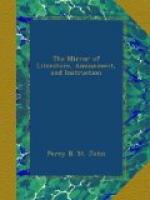to the king, when the steward breaks the seal, and
places the dishes before him. Some of the infant
princes are generally present, and partake in this
repast. The chief physician is invariably in attendance
at every meal. His presence is deemed necessary,
the courtiers say, that he may prescribe an instant
remedy, if any thing should disagree with the monarch;
but this precaution, no doubt, owes its origin to
that suspicion which is continually haunting the minds
of such as exercise despotic power. When his
public duties are performed, he usually retires to
the haram, where he sometimes indulges in a short
repose. Some time before sunset he always makes
his appearance in the outer apartments, and either
again attends to public business or takes a ride.
His dinner is brought between eight and nine, with
the same precautions and ceremonies as at breakfast.
He eats, like his subjects, seated upon a carpet,
and the dishes are placed on a rich embroidered cloth,
spread for the occasion. Some of the former kings
used to indulge openly in drinking wine; but none of
the reigning family have yet outraged the religious
feelings of their subjects by so flagrant a violation
of the laws of Mahomed. Bowls filled with sherbet,
made of every species of fruit, furnish the beverage
of the royal meals; and there are few countries where
more pains are bestowed to gratify the palate with
the most delicate viands. After dinner, the king
retires to the interior apartments, where it is said
that he is often amused till a late hour by the singers
and dancers of his haram. It is impossible, however,
to speak of his occupations after he passes the threshold
of his inner palace. He is there surrounded by
a scene calculated, beyond all others, to debase and
degrade the human character.
The harams are governed by the strictest discipline;
and this must be necessary to preserve the peace of
a community, where the arrogance of power, the pride
of birth, the ties of kindred, the intrigues of art,
and the pretensions of beauty, are in constant collision.
The usual routine of the king’s life is often
interrupted by urgent public affairs, and sometimes
by amusement. The reigning family has hitherto
disdained those enervating and luxurious habits which
led the last Seffavean monarchs to confine themselves
to their harams. They not only attend personally
to public business, but are continually practising
manly exercises, and engage in field sports with all
the ardour of a race who cherish the habits of their
Tartar ancestors. The present king is an expert
marksman and an excellent horseman; few weeks pass
without his partaking in the pleasures of the chase.
The king has always a historiographer and a chief poet.
The one writes the annals of his reign; the other,
who has a high rank at court, composes odes in his
praise, and, with grateful ardour, celebrates the
munificence of his patron. A giant and a dwarf
were at one period of the present reign part of the




